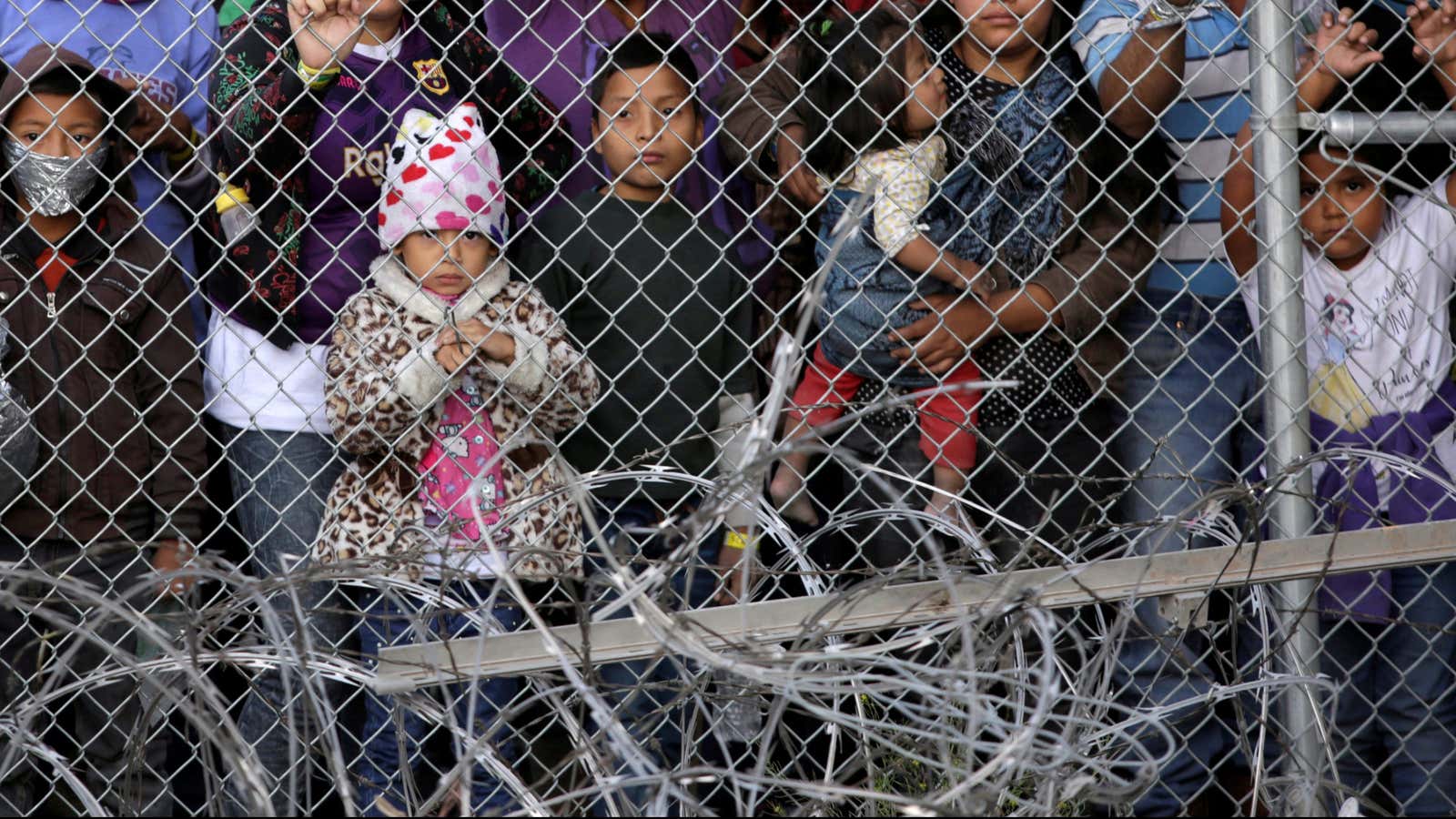This past June, US president Donald Trump’s lawyers attempted an appeal of a 2017 court decision, wherein US district judge Dolly Gee found that “safe and sanitary” conditions for unaccompanied immigrant children held in US detention centers were not being met.
Despite the many horrifying reports detailing humanitarian atrocities at US Customs and Border Protection (CBP) facilities along the US-Mexico border, Trump’s lawyers argued that conditions are lawful for the thousands of unaccompanied immigrant children detained by the government.
The legal requirement for “safe and sanitary” conditions were part of the (now under attack) 1997 Flores agreement, which covers treatment of minors while in custody, including limits to the time the US government can detain unaccompanied immigrant minors.
CBP authorities have denied that their conditions are illegal and inhumane, even though the Office of Inspector General’s (OIG) own investigation corroborates that children continue to face a horrific environment while in government custody.
The court issued its decision to dismiss the appeal on August 15, and the Trump administration responded by moving to throw out the entire agreement.
But where does this leave us on the issue of food and basic nutrition?
Border security x food security
The evidence providing the basis for Gee’s initial ruling, as well as conditions described in the OIG’s 2019 report, detail inadequate food conditions, both in terms of food safety and quantity. And whether or not the Flores agreement survives the Trump administration’s efforts to strike it down, a close look at the legal attention to nutrition and food security is troubling.
Lawyers and physicians who toured several CBP facilities this summer described rotten and expired food, lack of hot meals, baby formula not designed for the ages of the babies receiving it, and inadequate access to drinking water. These conditions certainly constitute a violation of the Flores agreement. However, the agreement only requires that immigrant children held in custody must have access to “water and food as appropriate.”
Both during the hearing and in the resulting ruling, the judges made it abundantly clear that soap, toothbrushes, and ability to sleep fall well within the public understanding of basic safety and sanitation.
Sarah Fabian, the Trump administration’s Justice Department attorney, argued that enumerating items such as soap and toothbrushes, or activities such as sleep, would count as a modification of the terms of the Flores agreement, where such provisions were not expressly detailed.
Public fury ensued. Footage of the June hearing has since gone viral, showing judges exasperatedly questioning Fabian’s assertion that soap and sleep could somehow be excluded from the concept of “safe and sanitary” conditions.
The opinion attached to the dismissal, written by judge Marsha Berzon, strongly opposed the idea that requiring soap and other basic necessities constituted modification of the Flores agreement; rather that “it interprets the Agreement’s requirement that minors be held in ‘safe and sanitary’ conditions ‘consistent with the [government’s] concern for the particular vulnerability of minors.’”
Berzon also flatly rejecting the lawyer’s suggestion that perhaps they were not outlined in Flores because parties could not agree as to whether or not the specific items qualified.
Food x awareness
The appellate court opinion relies on the idea that where specifics of treatment are not laid out, we are to refer to our common understanding of what those conditions would be.
There is arguably much more room for interpretation with regards to food security.
Our common understanding is that sleep is a necessity and that use of soap prevents the spread of germs that cause diseases. Surely the need for access to clean drinking water can easily falls into our common understanding of “safe and sanitary.” But our understanding of appropriate food is significantly less common.
Given that immigrant children’s need for sleep is really getting in the way of Trump’s vision for America to the extent that the administration has moved to terminate the agreement altogether, it’s not hard to imagine Fabian or another government attorney making a case against providing nutritious food options such as fresh fruit or whole grains.
And a diet of bologna sandwiches and packet ramen might genuinely not seem problematic to our president, who guzzles soda, refuses fruit, and proudly serves stacks of Big Macs to college athletes.
He’s not alone of course. More than 40% of American adults are obese. As a country we over-consume heavily processed foods, red meat, and refined sugars while neglecting whole grains, fiber and fresh produce. That’s all to say, let’s hope our common understanding of adequate food isn’t based on our common bad dietary habits.
Though there are plenty of studies and guidelines illustrating good food habits and the benefits of a varied, nutrient-rich diet, can it even be argued that the current USDA’s dietary guidelines constitute our “common understanding” of “food as appropriate” given the number of Americans who don’t follow the guidelines themselves?
Unfortunately, Berzon’s opinion doesn’t say. Because argumentation focused on specifics like sleep and soap, those were the examples laid out in the opinion.
Unfortunately for the nutritive health of immigrant children, all we have to go on is that, “assuring that children eat enough edible food, drink clean water, are housed in hygienic facilities with sanitary bathrooms, have soap and toothpaste, and are not sleep-deprived are without doubt essential to the children’s safety.”
We’ve cleared up the matter of soap and sleep, but is there room for fruit and vegetables? Our government missed a huge opportunity here: to state that our common understanding of “food as appropriate” includes access to a nutrient-rich diet.
Let’s at least hope the courts didn’t open the door to debate over our common understanding of “edible.”
